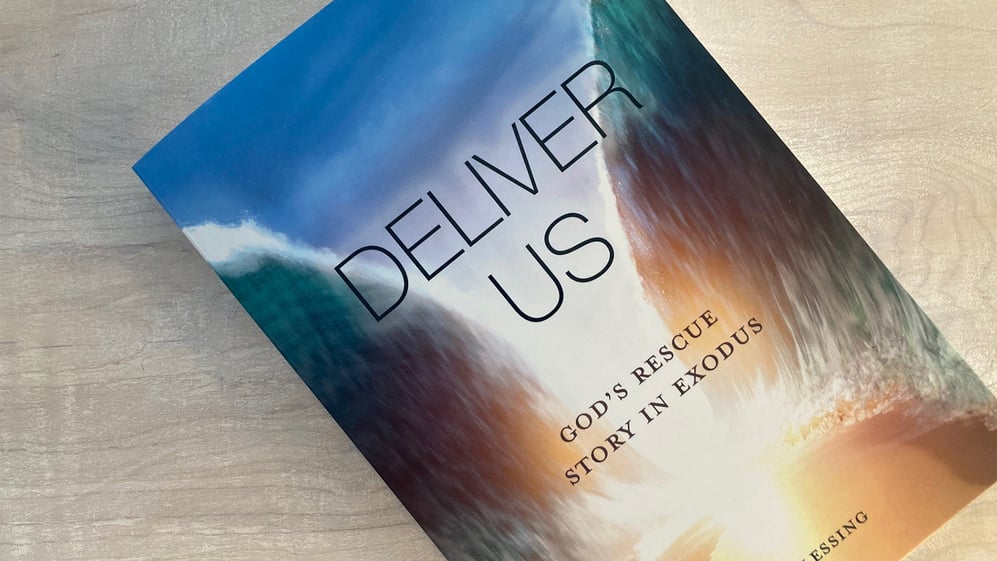My book list for last semester was more hefty than usual, and I dreaded putting in my $100 order at the bookstore. But there was one relief. A required book written by my professor wasn’t published yet, so we would be receiving the manuscript from him for free. What luck! I was excited to save some money, even though it still meant I had to read what I expected to be a dull textbook. My expectation was not met.
When it finally came time to write my final paper, I received an advance copy of the manuscript. I was to read the introduction and a specific chapter for reference. As I read the introduction, I realized that this was no textbook. It was a normal book! It was exciting, funny, educational, insightful, and engaging. Deliver Us, like R. Reed Lessing’s previous book, Overcoming Life’s Sorrows, is easy to read and annotate.
Readability
Lessing is one of those conversational writers. When you’re reading one of his books, you feel like you’re chatting with a friend or a mentor. Many spirituality books are unnecessarily complicated, using rare vocabulary words and long Dickens-like sentences.
Lessing writes for the layperson and the pastor alike. He uses terminology those with theology degrees are often the exclusive insiders on. However, what sets him apart is that he explains these things as easily as a breeze, so the layperson doesn’t feel looked down upon.
I’ve enjoyed reading Deliver Us as a college student because of its readability. Most college-level texts are migraine-inducing, but Lessing’s books are refreshing.
Take this quote for example: “In the original Hebrew, the Book of Exodus begins with the word and. Exodus 1:1 literally states, ‘And these are the names.’ The conjunction and implies continuity. It connects Exodus with its backstory—the Book of Genesis. Exodus takes Genesis forward” (13).
Applicability
One of my favorite things about Deliver Us is that I can apply it in my class and personal life. It isn’t a textbook. You can truly experience spiritual growth while reading Deliver Us because it allows for reflection and meditation. I found it to be easy to read a section, stop, think, write a response or prayer, and continue my reading.
This isn’t just a book that I’ll read once and keep on the shelf forever. It’s relatable and real. He relates the realities of life as a broken, sinful human to his main points. Lessing writes,
We know about fake and phony victories, the kinds of victories that don’t count for anything. Like when you think you’ve landed the job, but after six months it turns out to be a nightmare. Like when you think you’ve met Mr. Right, only to find out that he’s Mr. Wrong. Like when you work so hard to make the team, only to sit on the bench for the rest of the season. We’re all hungry for real victory. For a victory that lasts, that has enduring significance (132).
Educational
Of course, Lessing wouldn’t have assigned this book to his class if there were nothing to learn from it. The class was Principles of Biblical Interpretation, and we were focused on Exodus. Our big project was a fourteen-page exegetical paper on a set of verses in Exodus of our choosing. This book was one of our root resources because of how Lessing dissects Exodus in Deliver Us.
I wrote and highlighted everywhere in this book. From the heartwarming stories to the dad jokes, I almost forgot I was reading for a class. I was engaged, and I loved learning at every turn. Things I’ve never noticed before, such as the importance of names in the Book of Exodus, invigorated me to keep reading and helped me write an insightful paper.
There is an example of a learning opportunity in this passage:
God gives His Law not to make our lives miserable but to protect us from another kind of bondage—sin and self-destruction. God also wants to keep His people from becoming another Egypt, which would negate His mission to the world. The Law, then, is good (191).
Encouraging
Another thing about how Lessing writes is that he evenly mixes theology with personal applications. Deliver Us is a great example of his ability to do this. While I learned so much about Exodus that I never knew before, I also learned about myself. I could apply what I learned and meditate on the type of person I want to be in Christ.
I was encouraged to be a better version of myself. I was reminded of who I am and who I was meant to be. Sure, you can say I’m being dramatic, but I’m truthful. Deliver Us reminds us of who our Savior is and who we are in Him. We’re reminded of who God is and always will be.
Lessing writes,
You’re not too old. You’re not too sinful, too broken, or too messed up. And you’re not too far gone. God welcomes you into His loving presence. I invite you to celebrate with David, “O LORD I love the habitation of Your house and the place where Your glory dwells” (Psalm 26:8 ESV) (245).
I cannot explain how much I want everyone to read this book. Not only is it easy to read but it has taught me so many things about my faith. I feel stronger than ever in my beliefs. Lessing is a relational writer, so it never feels like a lecture. Whether you’re looking for spiritual growth and pleasure reading or you’ve got a paper to write, Deliver Us is the perfect book.
Quotations from Deliver Us, copyright © 2022. Concordia Publishing House. All Rights reserved.
Scripture: ESV®.
Order Deliver Us today!













